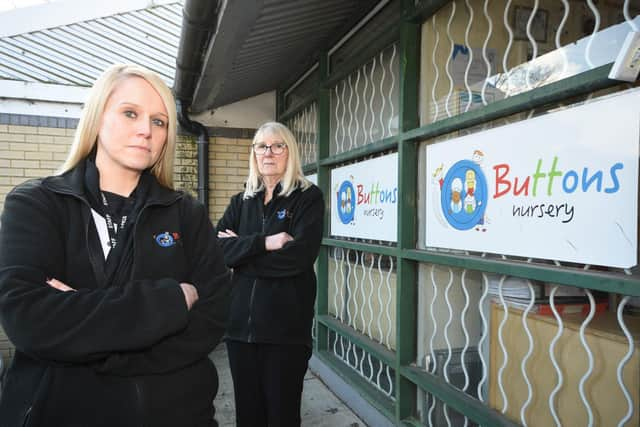Sunderland nurseries facing fee hikes and closures: Boss pleads with Government to ‘plug the funding gap’ to support city's childcare for working parents
and live on Freeview channel 276
The funding shortfall revolves around the the perceived 30 hours Government funded ‘free places’ for children over the age of three.
Buttons Nursery in Washington currently receives £4.88 per hour of Government funding for ‘free place’ children, but manager Michelle Barr, 38, said the reality is the cost is “far higher” leaving nurseries in a position of having to increase fees and not being able to pay staff a wage which is more inline with their levels of responsibility.
Advertisement
Hide AdAdvertisement
Hide AdShe said: “When you take into account staff ratios and their hourly rate as well as the rising costs of food, energy and classroom resources this doesn’t come close to covering the full costs.
"This means we then have to put up the costs for our fee paying parents. The term free places really should be reworded by the Government to partially funded.
"We always write to parents explaining why we are having to put costs up, but this perception that places are free can lead to a misunderstanding as to why prices need to rise.
"We are okay at the moment but I do worry about the longer-term planning and we are having to look at ways to cut our costs such as considering to charge extra for food. Nurseries in general are struggling and I’m aware of some nurseries which face potential closure unless the funding from central Government increases.”


Advertisement
Hide AdAdvertisement
Hide AdA key grievance for Michelle, who has worked at the nursery since 2008 and has been co-owner since 2013, is the discrepancy in business rates with other areas of the UK.
She said: “We have to pay thousands of pounds each year in business rates which the same size nurseries in Scotland and Wales don’t have to pay. This is something which really angers and annoys me.
"It is totally unfair and has been raised by the National Day Nursery Association. Why should we get penalised for being in England?
"This additional money would make a massive difference in plugging the funding gap and allow me to pay staff a wage more inline with what they deserve.”
Advertisement
Hide AdAdvertisement
Hide AdMany nursery practitioners are currently paid the minimum wage which the Government has announced will increase by 9.7% in April, however Michelle said this is not reflected in the increase in central funding.
She said: “We’ve been told our free place per child funding is going to increase by five pence an hour but this isn’t going to be anywhere near covered by this.
"I’m all for this increase, but in order for the funding gap not to increase even further, it needs to be centrally funded.”
The funding of child places and wages has created a culture in which the nursery sector and the staff who work in it “feel undervalued”.
Advertisement
Hide AdAdvertisement
Hide AdMichelle said: “The education of the under fives is crucial in a child’s development but the lack of funding from Government and the salaries of the well qualified staff doesn’t reflect this.
"There is nothing more precious than someone’s child and so there is a massive responsibility there, yet people can earn more elsewhere in less stressful jobs.
"Fortunately we have not had a big turnover of staff but I was recently at a meeting with nursery owners and recruitment and retainment is an issue. We’ve adopted a grow our own policy and have taken on three apprentices who’ve been learning while working.”
Deputy manager Lilian Douglas, 62, who has worked at the nursery since 1998, said: “I just don’t think we are valued as a profession by the Government who seem to see us as a baby sitting service but many of us have degrees and are educated in the teaching of young children but this isn’t reflected in the pay and funding.
Advertisement
Hide AdAdvertisement
Hide Ad"During the pandemic nurseries continued to look after children. You can’t socially distance from a two-year-old and so people were putting themselves at risk, but this all seems to have been forgotten.”
With nurseries inevitably having to put up prices to plug the funding gap or charge for additional services, Michelle feels there will eventually be a tipping point which won’t be financially viable for parents.
She said: “The Government wants people to go to work and pay into the economy but for a mother looking to return to work, if the price of childcare rises to a point where it’s not worth returning then people will stay at home.
"It would be nice for the sector to get some recognition from the Government through funding which is financially viable and across the board, not just at three and over.”
Advertisement
Hide AdAdvertisement
Hide AdResponding to the situation a Department for Education spokesman said: “We recognise that families and early years providers across the country are facing financial pressures and we are currently looking into options to improve the cost, flexibility, and availability of childcare – ensuring that any plans we bring forward focus on improving outcomes for children.
“We’re investing millions in better training for staff working with pre-school children and have set out plans to help providers run their businesses more flexibly.”
The Government also cited that in September 2022 it announced “unprecedented support” to protect all businesses, including in the Early Years sector, from high energy prices, and is investing an additional £20m into the sector following the announcement of the minimum wage increase.
Comment Guidelines
National World encourages reader discussion on our stories. User feedback, insights and back-and-forth exchanges add a rich layer of context to reporting. Please review our Community Guidelines before commenting.
